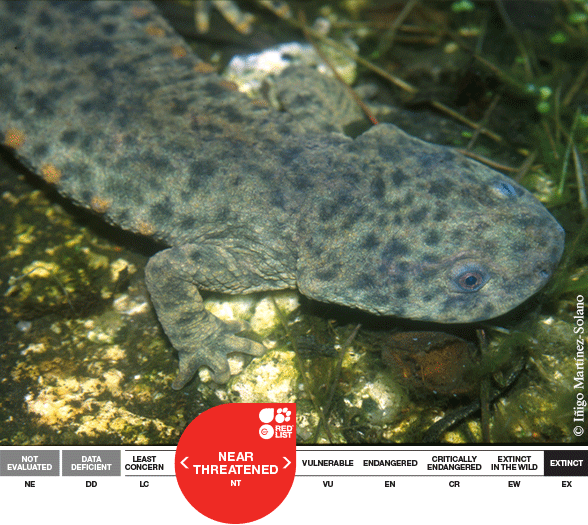
Also known as the Sharp-ribbed Newt or Salamander, Pleurodeles waltl is found in Portugal, Spain and northern Morocco. It is a highly aquatic species, found in scrub, cultivated land and woodland. This newt possesses a distinctive defense mechanism, giving it its name; it is able to pierce it’s ribs through its skin, which can aid in puncturing predators. It is listed as ‘Near Threatened’ on the IUCN Red List of Threatened Species TM.
The species resides in fragmented populations, with an overall population decrease. A main cause of population decline is habitat loss as a result of agrochemical pollution, drainage, eutrophication, livestock and development. The species was once present on coastal areas but has since retreated due to an increase in tourism and human population. Introduced species are also a threat; fish and crayfish prey on the eggs and larvae.
Some populations are within protected areas in Iberia and the species is listed in Appendix III of the Bern convention. Spanish and Portuguese populations require further monitoring, although legislation in Spain ensures protection of the species, including the implementation of habitat restoration and captive breeding projects.
References:
Pedro Beja, Jaime Bosch, Miguel Tejedo, Paul Edgar, David Donaire-Barroso, Miguel Lizana, Iñigo Martínez-Solano, Alfredo Salvador, Mario García-París, Ernesto Recuero Gil, Tahar Slimani , El Hassan El Mouden, Philippe Geniez, Tahar Slimani 2009. Pleurodeles waltl. In: IUCN 2012. IUCN Red List of Threatened Species. Version 2012.2. . Downloaded on 09 January 2013
Arnold, N. & Ovenden, D. Collins Field Guide Reptiles and Amphibians of Britain and Europe. Harper Collins Publishers Ltd, London. 2002.
